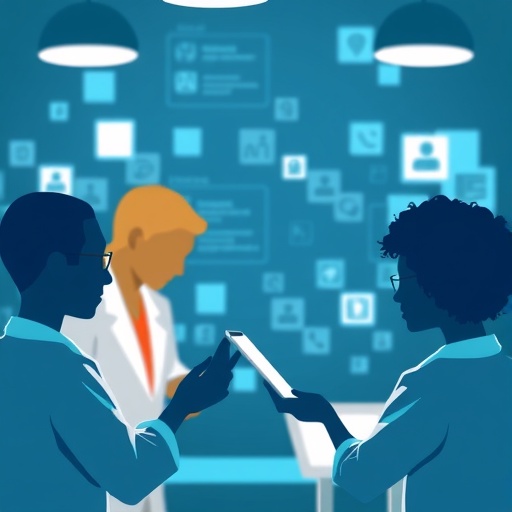As detailed in their published paper in Frontiers in Public Health, the researchers emphasize that connection to technology—ranging from broadband internet to smartphones—can lead to more equitable healthcare experiences. These technologies, including telehealth services and health-related social media platforms, serve as essential tools that can counteract the systemic barriers that many African Americans face when trying to access healthcare. Larnyo notes that their findings underscore the importance of addressing both digital and structural barriers that contribute to inequities.
Unfortunately, the historical context plays a crucial role in understanding healthcare access for African Americans. Many continue to face a myriad of challenges, often compounded by socio-economic factors. Tettegah recalls a prominent high-profile case involving the tennis superstar Venus Williams, who suffered from severe pelvic pain due to undiagnosed uterine fibroids. Williams’ experience highlights a systemic issue where African American patients’ concerns are frequently dismissed or inadequately addressed by healthcare providers, perpetuating harmful stereotypes and leading to distressing outcomes.
.adsslot_sPjAE5ovtK{width:728px !important;height:90px !important;}
@media(max-width:1199px){ .adsslot_sPjAE5ovtK{width:468px !important;height:60px !important;}
}
@media(max-width:767px){ .adsslot_sPjAE5ovtK{width:320px !important;height:50px !important;}
}
ADVERTISEMENT
The medical community’s understanding of the unique healthcare needs of African Americans is essential for ensuring better outcomes. Tettegah poses a challenging question: how can primarily non-Black healthcare providers truly grasp the distinct needs of their patients of color? She emphasizes that effective advocacy often must come from the patients themselves, a privilege that many do not possess. This lack of agency can lead to significant health disparities, as individuals from lower socio-economic backgrounds may not have the resources or knowledge needed to navigate the healthcare system.
Healthcare in the U.S. inherently carries financial burdens, and these costs can be prohibitive. Health insurance premiums, medical visits, and medications all contribute to a market where only those with sufficient financial means can access cutting-edge healthcare technologies. As the researchers indicate, individuals with a higher socio-economic status are exponentially more likely to have access to essential technologies that facilitate improved healthcare experiences, thereby reinforcing existing disparities. The intersection of socio-economic status and technology access is fundamental to addressing the healthcare divide.
The UCSB research team systematically explored the intricate dynamics between technology access and healthcare outcomes, revealing striking correlations. Their data, derived from surveys involving 815 African Americans, indicated clear patterns: an increase in socio-economic status correlates with enhanced access to technology. Furthermore, as access to technology grows, the utilization of health-related technologies also rises, correlating positively with better health outcomes. Conversely, a notable negative association emerged between technology access and healthcare disparities; limited access leads to exacerbated disparities in healthcare experiences.
The implications of these findings are profound. To overhaul the healthcare landscape, both socio-economic disparities and technology access must be tackled simultaneously. The researchers advocate for practical, impactful solutions, starting with the establishment of accessible, affordable broadband internet services and smartphones. These technological lifelines can empower African Americans by allowing them to seek out necessary health information and services more efficiently.
Moreover, a nuanced approach to telehealth solutions is needed. Cultural considerations must inform how these services are designed and implemented. There is a pressing need for telehealth solutions that resonate with the unique experiences and challenges faced by ethnic minorities. The integration of mental health applications and user-friendly health-related social media platforms could further enhance engagement with healthcare resources among African American communities.
Raising awareness about health disparities and the specific needs of communities of color is imperative. Tettegah stresses the importance of disseminating information that highlights the importance of tailored health interventions. By educating healthcare providers about the variances in disease susceptibility and health outcomes across different ethnic groups, a more equitable healthcare landscape can be cultivated. The research conducted by the UCSB team exemplifies the potential that data-driven advocacy possesses in driving systemic change.
The findings elucidate a critical narrative that points to the necessity of structured policy changes rather than piecemeal solutions that focus solely on individual cases. Structural racism and economic inequality are intertwined, and to dismantle these barriers, comprehensive policies are required to foster digital equity. The path toward healthcare equity for African Americans lies not just in individual technology adoption but in a collective effort to reform the systems that perpetuate disparities.
The work of Tettegah and Larnyo highlights both the challenges that persist in the healthcare landscape as well as potential pathways to achieving greater equity. As the researchers advocate for a shift toward addressing both structural and technological inequities, the importance of collaboration among stakeholders is underscored. Institutional change, which inherently requires the participation and commitment of a diverse array of voices, is crucial for advancing health equity.
The study conducted by UCSB positions technology not merely as an accessory to healthcare but as a pivotal instrument in reshaping the healthcare experience for one of America’s most marginalized populations. As evidence mounts that access to technology can lead to better health outcomes, it becomes increasingly clear that investments in digital inclusion are not just beneficial but essential for collective progress.
In conclusion, the opportunity exists to transform the healthcare experience for African Americans through targeted interventions that prioritize technology access as a key contributor to health equity. By rethinking how healthcare is delivered and who can access it, the landscape can be reshaped to ensure better health for all. The push for equity demands constant vigilance, informed policymaking, and collaborative efforts that challenge the status quo.
Subject of Research: Technology Access and Healthcare Disparities
Article Title: Bridging the Gap: Technology Access as a Catalyst for Healthcare Equity in African American Communities
News Publication Date: October 2023
Web References: https://news.ucsb.edu/people/sharon-tettegah, https://longevity.ucsb.edu/people/researchers/ebenezer-larnyo, https://www.blackstudies.ucsb.edu/home
References: Frontiers in Public Health
Image Credits: UCSB Communication Team
Keywords
Technology, healthcare disparities, African American health, telehealth, socio-economic status, digital equity, health outcomes, systemic racism.
Tags: addressing healthcare inequitiesbroadband internet and healthcaredigital divide in healthcareEquity in Healthcare Accesshealthcare disparities among African Americansimproving care quality through technologyresearch on healthcare access solutionssocial media in health communicationsocio-economic impact on health accesssystemic barriers to healthcare for minoritiestechnology access in healthcaretelehealth services for underserved populations





